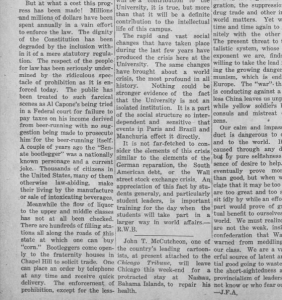
Published on January 28th, 1932 by The Daily Tar Heel, this newspaper article discusses the positive and negative aspects of Prohibition on a national scale and in Chapel Hill. https://universityofnorthcarolinaatchapelhill.newspapers.com/image/67938693
Prohibition and Al Capone: How They Both Influenced Everyday Tar Heels
In this article, published on Thursday, January 28, 1932 by The Daily Tar Heel, the editor argues for both sides of the argument on Prohibition in a seemingly subtle, and Devil’s advocate-like manner. Alongside the almost unblemished report of the positivity the 18thAmendment was receiving, due to its effectiveness on reducing the crime and unemployment rates of cities and towns, the editor also hints at the developmental corruption and multitude of hidden agendas backing the Prohibition movement.
While not directly connected to the Chapel Hill food story, the arrest and imprisonment of Al Capone, a well-known American gangster, was crucial in the way in which it gave authorities and the general public the boldness needed to bolster them in taking back their cities from the criminal underground that had unknowingly continued to grow and thrive. A majority of the blame for this unhindered growth can be attributed to the increasing popularity for the secretive market of alcoholic beverages amongst a large variety of citizens, including the middle-class, fraternity brothers, and even students on campus. Much like the way Al Capone would supply alcohol to his political and social cohorts, bootleggers would regularly come onto the UNC campus and sell alcohol to the fraternity houses.
Even with all of the law enforcement actively pursuing alcohol trafficking during the Prohibition era, some of the most prosperous times for bootlegging in history occurred at the time when America became a dry country. Many states had already been enforcing prohibition when the 18thAmendment was passed, where North Carolina had been considering itself a dry state since 1908. The relevance of this to Chapel Hill and the Chapel Hill food story, is that prohibition established a sense of unity. Growing from the shared mentality that Prohibition was a thing of the past and the development of an even greater appreciation for the community, Chapel Hill began to transform and mold itself into the place that we call home.
Alongside the obvious criminal implications of the Prohibition era, it is important to also note that the 18thAmendment could have been adopted for selfish motives among the American elite, just as easily as it could have been adopted for the noble and inherently positive motives pursued by others. The true motivation behind the 18thAmendment may never actually be attributed to one thing, but the fact that many different factors lead to its establishment makes it all the more interesting. This just shows how something so prominentand arguably negative still plays its role as another page in another book of the Chapel Hill food story.
Sources:
- L., D. M., ed. “Prohibition’s Degradation To National Constitution.” The Daily Tar Heel (Chapel Hill), January 28, 1932, Number 91 ed., Volume XL sec. Accessed November 08, 2018. https://universityofnorthcarolinaatchapelhill.newspapers.com/image/67938693
